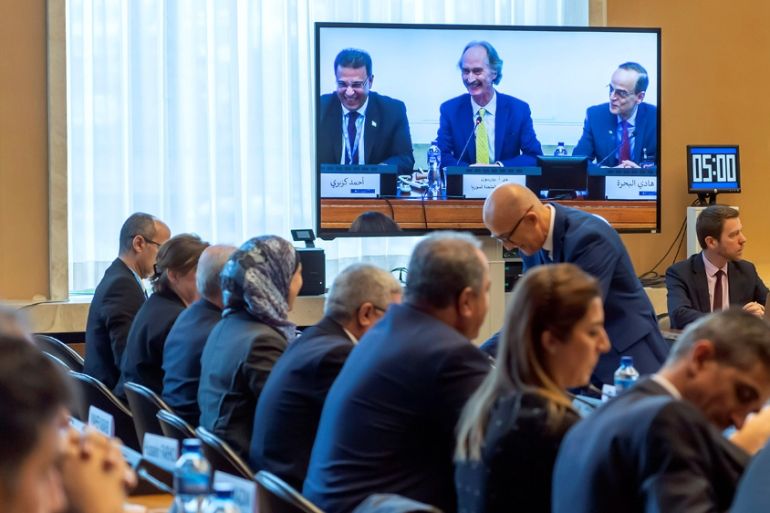UN envoy: First Syria talks in over a year better than expected
Syria government and opposition representatives met to discuss a future constitution in Geneva but did not shake hands.

The United Nation‘s envoy for Syria says first talks in Geneva on the country’s constitution involving Syrian opposition, government and civil society representatives have “gone much better” than many would have expected.
Geir Pedersen said on Friday that the two co-chairs of the constitutional committee from President Bashar al-Assad‘s government and the leading opposition have agreed to meet again on November 25, and that delegations would in coming weeks “hopefully come up with a work plan”.
Keep reading
list of 3 itemsNew report reveals extent of Iran’s growing Middle East influence
Civilian deaths as Idlib hospital struck by Russian air raids
Representatives of both sides met to discuss a future constitution, part of plans for a political settlement to end eight and a half years of war.
Expectations for the talks have been low, with Damascus and its Iranian and Russian allies having made gains on the battlefield that left them few reasons to grant concessions.
|
|
Acknowledging that discussions were sometimes difficult, UN envoy Geir Pedersen said delegates from the government, opposition and civil society had behaved with professionalism.
“These are sometimes very painful discussions and it takes courage to listen to the other side defending its views on these issues,” he told journalists in Geneva.
“I believe it has gone much better than most people would have expected,” he said.
The government delegation had been seeking to hold the next round of talks in Syria’s capital, which the opposition had strongly resisted.
The talks are focused on drawing up a constitution with a view to eventually holding elections in Syria, a less sweeping agenda than at UN-sponsored talks earlier in the war, which collapsed over rebel demands that al-Assad leave power.
Rebel fighters who once aimed to overthrow al-Assad now hold only a small pocket of northwestern Syria and have been driven out of all its major population centres.
‘Not very easy’
The talks kicked off last week with a ceremony and plenary session involving 150 delegates – split evenly between Syria’s government, the opposition and Syrian civil society.
After 10 days of talks, there was no immediate agreement on the release of thousands of detainees, an issue that Pedersen has underscored as key to building confidence.
Nor was there consensus on whether delegates from the so-called “small group” in charge of drafting the constitution would adapt a 2012 constitution or start afresh with a new one.
Damascus has indicated it is merely willing to tweak the existing constitution, but Ahmed Kuzbari, the meeting co-chair representing the government-backed delegation, told reporters both scenarios were possible.
“We could draft a new constitution as long as it meets all of the objectives of the Syrian state,” he said, insisting on respect for Syrian sovereignty.
“We did not come to build a new state. The Syrian Arab Republic is a state: it has a constitution, a parliament, a government, an army and institutions,” Kuzbari added.
Talks between the parties were often heated, delegates said, particularly on the issue of “terrorism”, a term used by the government side to refer to rebels, with the government body seeking to incorporate this within the constitutional reform project. The opposition side resisted this.
“Discussions were not very easy,” the opposition co-chair Hadi al-Bahra said, noting that he had yet to shake hands with his counterpart.
“We all had to be reasonable and go beyond the differences and to focus on the parts that unify Syrians.”